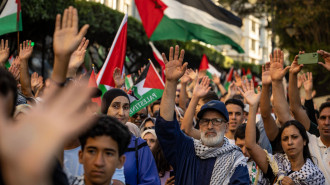At least 20,000 children trapped in Iraq's Fallujah
The UN children's fund has issued a stark warning to Iraqi troops and Islamic State militants in the battle for Fallujah to spare the children, the most vulnerable among the tens of thousands of civilians who remain trapped by the fighting for control of this city west of Baghdad.
Backed by aerial support from the US-led coalition and paramilitary forces, Iraqi government troops more than a week ago launched a military operation to recapture Fallujah which has been under control of the extremist group for more than two years.
As the battled unfolded — with Iraqi forces this week pushing into the city's southern sections after securing surrounding towns and villages — more than 50,000 people are believed to be trapped inside the Sunni majority city, about 65 kilometres (40 miles) west of Baghdad.
The UNICEF estimated the number of the children trapped with their families inside the city at about 20,000, warning that they face a dire humanitarian situation, in addition to the risk of forced recruitment into the fighting by the IS militants.
"Children face the risk of forced recruitment into the fighting, strict procedures for security screening and separation from their families," Hawkins said.
"Children who are recruited see their lives and futures jeopardised as they are forced to carry and use arms, fighting in an adult war."
 |
Children face the risk of forced recruitment into the fighting... Children who are recruited see their lives and futures jeopardised as they are forced to carry and use arms, fighting in an adult war |  |
UNICEF renewed calls for safe corridors to be opened to allow Fallujah's civilian population to escape.
The few residents who have managed to flee the Fallujah area speak of severe shortages of food and drinking water.
The few hundred families who have escaped IS territory were camped out on the outskirts and residents reached by phone inside the city spoke of even worse conditions.
The United Nations has accused IS of using the civilian population as human shields as it prepares to mount a desperate defence of one of its most emblematic bastions.
Fallujah was the first large city in Iraq to fall to IS and it is the last major urban area controlled by the extremist group in western Iraq. The militants still control the country's second-largest city, Mosul, in the north, as well as smaller towns and patches of territory in the country's west and north.
The fight for Fallujah is expected to be protracted because the Islamic State group has had more than two years to dig in. Hidden bombs are believed to be strewn throughout the city, and the presence of trapped civilians will limit the use of supporting airstrikes.
Agencies contributed to this report

![Palestinians mourned the victims of an Israeli strike on Deir al-Balah [Getty]](/sites/default/files/styles/image_684x385/public/2024-11/GettyImages-2182362043.jpg?h=199d8c1f&itok=xSHZFbmc)


![The law could be enforced against teachers without prior notice [Getty]](/sites/default/files/styles/image_684x385/public/2178740715.jpeg?h=a5f2f23a&itok=hnqrCS4x)


![Left-wing candidate Jill Stein campaigns in Michigan in October [Getty]](/sites/default/files/styles/image_330x185/public/2024-11/GettyImages-2176828619.jpg?h=199d8c1f&itok=h2FXzBuP)